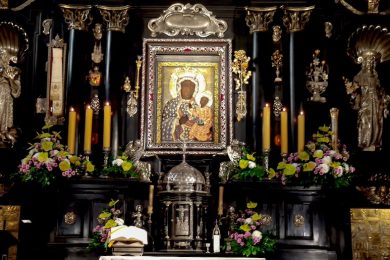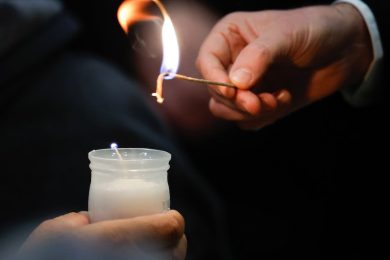By Chris Byrd | Catholic News Service
NEW YORK (CNS) — The Good Friday Agreement, brokered by U.S. special envoy and former Sen. George Mitchell and signed April 10, 1998, brought a fragile peace to Northern Ireland.
Although sporadic violence continued, notably including the gruesome Omagh bombing, the accord largely marked the end of a three decadeslong period of sectarian strife.
This bloody conflict, which had antecedents stretching back to the 17th century, was popularly known as “the troubles.” It pitted the province’s Protestant majority, loyal to the United Kingdom, against those in the Catholic community determined to reunite Ireland as a single republic.
That history informs the melodramatic crime procedural “Bloodlands.” Having premiered on BBC One in February, the handsomely produced and well-acted miniseries began streaming March 15 on Acorn. One additional episode will become available each Monday through April 5.
Executive producer Jed Mercurio has previously played the same role behind the scenes of such popular British fare as “Line of Duty” and “Bodyguard.” Chris Brandon created and scripted “Bloodlands,” which Pete Travis directed.
Centered on the hunt for a serial killer, the show is obviously not for kids. But other challenging themes, from prostitution and adultery to sexually transmitted diseases, are present as well.

Additionally, characters lapse into some rough and crude language, though this is not excessive. Through the three episodes available for review, moreover, there were no depictions of sexual activity.
Catholic viewers in particular, however, will find references to a priest who, after his death, was discovered to have had a wife and child distasteful.
“Bloodlands” chronicles the personal and professional life of Belfast-based detective chief inspector Tom Brannick (James Nesbitt). Widowed by the murder of his wife, Tom is pleased that his daughter, Izzy (Lola Petticrew), a medical student, has found herself a “nice lad” in the person of her new beau, Larry (Asan N’Jie).
The upbeat mood inspired by his introduction to Larry is dissipated, however, when Tom is summoned to the city’s port. There, a car belonging to Pat Keenan (Peter Ballance), a businessman with Irish Republican Army ties, has been salvaged from the sea.
Keenan has been kidnapped, and inside his vehicle, Tom finds a postcard depicting cranes owned by the famous shipbuilding firm Harland and Wolff. That’s the calling card of a multiple murderer nicknamed Goliath.
Goliath is believed to have been responsible for the killing of several loyalists and IRA members who had the ability to scuttle Mitchell’s peace deal in the months before it was concluded. Among the victims claimed by Goliath, who is thought to have been a department insider, was Tom’s late spouse, once a military police officer.
The first person Tom calls to discuss Goliath’s possible reemergence is his former partner, Catholic detective chief superintendent Jackie Twomey (Lorcan Cranitch). After taking over the latest investigation of Goliath from Protestant superintendent McCallister (Flora Montgomery), Jackie begs Tom not to tangle with its target again.
“Think of Izzy,” Jackie says. “You’ve raised her in a world without all this.” Predictably, such advice is lost on the still-grieving husband.
Tom’s assistant, detective Sgt. Niamh McGovern (Charlene McKenna) connects the present to the past. “The Keenan case,” she observes, “has been orchestrated by someone who wants us to find Goliath.”
Viewers will be impressed by the program’s strong cast, among whom Nesbitt stands out. As an Ulster native, he’s certainly at home here. And the way he arranges his face to express the range of emotions his part demands — from tenderness to fury and ruthless determination — is wonderful to watch.
The show also drives home how difficult enduring religious enmity and suspicion make it for this still-divided region to escape its violent past and shape a better future.
“Bloodlands” was shot on location in Belfast and around Strangford Lough and cinematographer Arni Filippusson makes good use of the latter’s starkly beautiful landscapes. Red herrings in the plot, moreover, successfully keep the audience guessing. Grown TV fans will, accordingly, find this drama of dark secrets just the sort of programming at which the BBC excels.
Byrd is a guest reviewer for Catholic News Service.




















